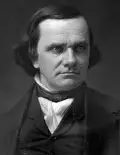Popular Sovereignty, the idea that people should have a government of their choosing, was one of the founding ideals of both the Declaration of Independence and the Constitution. It was the basis of the protests over "taxation without representation," the quartering of British soldiers in American houses without consent or compensation, and a host of other actions and laws to which English colonists in American took offense in the late 18th Century. Popular Sovereignty in the 19th Century, in the shadow of the American debate over slavery, was the idea that the residents of a newly formed territory or state could decide for themselves on the question of slavery, meaning pass their own state laws that allowed or prohibited people to own slaves. The doctrine was widely publicized by Illinois Sen. Stephen A. Douglas; however, the first prominent supporter was Michigan Sen. Lewis Cass, who introduced a prototype of the idea during the Senate debate over the Wilmot Proviso in 1846. The U.S. was in the midst of a war with Mexico, and the Wilmot Proviso proposed to prohibit slavery in any territory that the U.S. gained as a result of winning the war. The U.S. won the war, but the Wilmot Proviso was defeated. 
Douglas (left), as author of the Compromise of 1850 and the Kansas-Nebraska Act, attempted to emed the ideas of Popular Sovereignty into federal law. In the former, Douglas was hoping to influence the settlement discussions for the New Mexico Territory and the Utah Territory; the Kansas Territory and the Nebraska Territory were the areas of focus for the latter. One of the prime flaws of the idea of Popular Sovereignty was that it relied on the ballot in the various states and territories. Particularly in the Kansas Territory but also in other new territories, disputes over whether to allow slavery led to violent conflicts, voter intimidation, and even electoral fraud. 
Douglas had envisioned the doctrine as a means of keeping the peace, meaning maintaining the delicate balance between "slave states" and "free states." As more and more people settled in more and more Midwestern and Western territories, the desire to augment the spread of slavery dimmed more and more. Leaders of southern states began to speak out against Popular Sovereignty for this reason; as well, they asked, what would happen to people who owned slaves in states that allowed the practice and who then moved into territories that did not? At the same time, advocates of the abolition of slavery were opposing Popular Sovereignty because it allowed for the possibility of slavery. Nonetheless, Douglas continued to champion and defend the idea. He did so prominently in the Lincoln-Douglas Debates, a series of public debates that he had with his opponent for the U.S. Senate, Abraham Lincoln. The advent of the Civil War made the debate over Popular Sovereignty moot. |
|
Social Studies for Kids
copyright 2002–2024
David White




